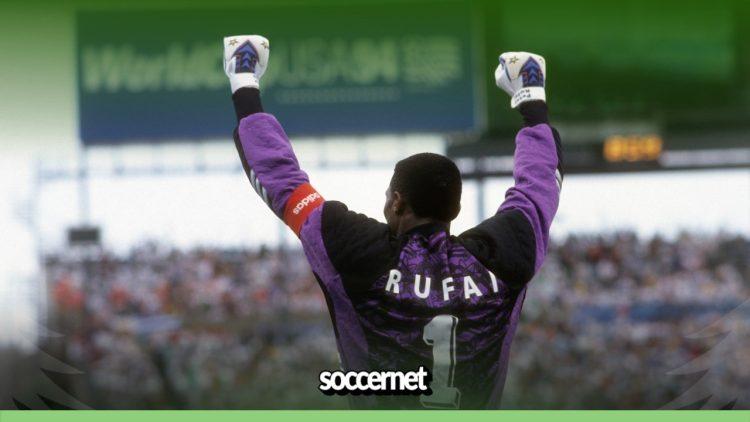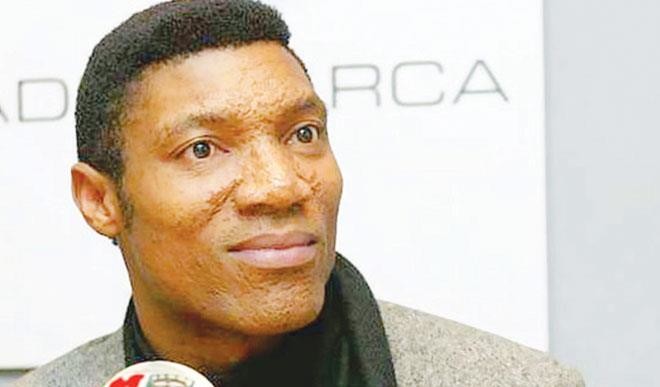Death of Super Eagles Goalkeeper Peter Rufai

Nigerian football legend and iconic Super Eagles goalkeeper, Peter Rufai, fondly known as 'Dodo Mayana', passed away on Thursday, July 3, at the age of 61. The news of his demise, following a prolonged illness including chest discomfort and cardiac arrest, sent shockwaves through the Nigerian football community and beyond, prompting an outpouring of tributes from various quarters.
The Nigeria Football Federation (NFF) expressed profound shock, with General Secretary Mohammed Sanusi stating they were unaware of his illness. President Bola Tinubu extended his deep sadness and condolences to the Rufai family, friends, and football enthusiasts, remembering Rufai as a patriotic sportsman who etched his name in gold in Nigerian and African sporting annals. Similarly, Dr. Patrice Motsepe, President of the Confédération Africaine de Football (CAF), conveyed his deep condolences, highlighting Rufai's role as part of a special generation that made Nigeria and Africa proud. Super Falcons player Asisat Oshoala paid a touching tribute by donning a black armband during a WAFCON match, while Terkaa Melai, Lobi Stars goalkeeper, acknowledged Rufai's inspiration to many young goalkeepers but also voiced disappointment over the abandonment of retired athletes like Rufai.
Born on August 24, 1963, in Lagos, Peter Rufai's journey to football stardom was unique and serendipitous. A prince of the Royal House in Idimu, Lagos, his first name 'Peter' was adopted during the Nigerian Civil War to conceal his Yoruba heritage while he was living in Port Harcourt with his mother. His goalkeeping career began unexpectedly during an inter-school match when he, a midfielder, stepped into goal after the frustrated goalkeeper quit. Despite a demoralizing U13 experience where he conceded nine goals, he was mentored by a coach named 'Tiger', who refined his raw talent. Rufai also trained as an electrician.
At just 17, Rufai made a bold move, traveling to Lagos without his mother's knowledge immediately after his final school exam to try out for Stationery Stores FC. Despite wearing his Christmas shoes instead of football boots, his talent shone through, earning him a spot. A year later, in 1980, he was their goalkeeper in the FA Cup final. In 1981, at 18, he played a pivotal role as Stationery Stores reached the final of the Africa Cup Winners' Cup, saving a penalty in the first leg.
Rufai made his debut for the then Green Eagles in December 1981. He made history in 1985 by becoming the first Nigerian goalkeeper to play professionally abroad, signing with Dragon FC of the Republic of Benin. His European club career included stints with K.S.C. Lokeren Oost-Vlaanderen and K.S.K. Beveren in Belgium, Go Ahead Eagles in the Netherlands, S.C. Farense in Portugal, and Deportivo La Coruña in Spain. He earned 65 caps for Nigeria throughout his illustrious career.
As the steady hands behind Nigeria's 'golden generation' of football, Rufai was instrumental in the Super Eagles' triumphs. He was the first-choice goalkeeper when Nigeria won the Africa Cup of Nations in Tunisia in 1994, a victory he clinched with crucial saves and a calm presence. He had also earned silver medals in the 1984 and 1988 AFCON tournaments. Rufai captained Nigeria in their historic debut at the FIFA World Cup in 1994 in the USA, where the team reached the Round of 16. He again served as the team's goalkeeper at the 1998 FIFA World Cup in France, leading them to the Round of 16 once more before retiring from the national team.
His career was marked by several memorable moments. In a unique feat for a goalkeeper, he scored a penalty in a 6-0 AFCON qualifier victory against Ethiopia on July 24, 1993. His composure was vital in the 1994 AFCON final against Zambia, where Nigeria won 2-1. In the 1994 World Cup, he secured clean sheets in historic 3-0 and 2-0 victories over Bulgaria and Greece, respectively. Despite a 2-1 loss to Italy in the 1994 World Cup Round of 16, his performance earned widespread acclaim. He was also the wall behind Nigeria's memorable 3-2 victory over Spain in the 1998 World Cup opener.
After retiring from active football, Rufai continued to contribute to the sport. He dedicated his post-retirement days to discovering and mentoring young players, establishing the Staruf Football Academy. He also served as the coordinator of Nigeria's U23 national team at one point and worked as a sports administrator in Belgium and the Netherlands. He later settled in Spain, opening a goalkeeper's school before returning to Nigeria to continue his youth development programs. Interestingly, in 1998, he turned down the ancestral throne in Idimu to continue his football career. Peter Rufai is survived by his wife and children, with his oldest son, Senbaty, having played for Sunshine Stars in the Nigerian Premier Football League (NPFL).
Recommended Articles
Former Super Eagles Goalkeeper Peter Rufai Dies

Nigeria is mourning the loss of legendary Super Eagles goalkeeper Peter Rufai, who passed away at 61. Known as "Dodo May...
Death of Nigerian Goalkeeping Legend Peter Rufai

Nigerian football mourns the death of legendary Super Eagles goalkeeper Peter Rufai, who passed away at 61. Known as 'Do...
Tributes & Observations on Late Goalkeeper Peter Rufai

Legendary Super Eagles goalkeeper Peter Rufai, affectionately known as 'Dodo Mayana,' has passed away at 61 after a prol...
Death of Nigerian Football Legend Peter Rufai

Nigeria mourns the passing of legendary Super Eagles goalkeeper Peter Rufai, known as "Dodo Mayana," at 61. A pivotal fi...
Nigeria Mourns Legendary Goalkeeper Peter Rufai

Nigeria is mourning the death of legendary former Super Eagles goalkeeper Peter Rufai, known as 'Dodo Mayana', who passe...
You may also like...
Diddy's Legal Troubles & Racketeering Trial

Music mogul Sean 'Diddy' Combs was acquitted of sex trafficking and racketeering charges but convicted on transportation...
Thomas Partey Faces Rape & Sexual Assault Charges

Former Arsenal midfielder Thomas Partey has been formally charged with multiple counts of rape and sexual assault by UK ...
Nigeria Universities Changes Admission Policies

JAMB has clarified its admission policies, rectifying a student's status, reiterating the necessity of its Central Admis...
Ghana's Economic Reforms & Gold Sector Initiatives

Ghana is undertaking a comprehensive economic overhaul with President John Dramani Mahama's 24-Hour Economy and Accelera...
WAFCON 2024 African Women's Football Tournament

The 2024 Women's Africa Cup of Nations opened with thrilling matches, seeing Nigeria's Super Falcons secure a dominant 3...
Emergence & Dynamics of Nigeria's ADC Coalition

A new opposition coalition, led by the African Democratic Congress (ADC), is emerging to challenge President Bola Ahmed ...
Demise of Olubadan of Ibadanland
Oba Owolabi Olakulehin, the 43rd Olubadan of Ibadanland, has died at 90, concluding a life of distinguished service in t...
Death of Nigerian Goalkeeping Legend Peter Rufai

Nigerian football mourns the death of legendary Super Eagles goalkeeper Peter Rufai, who passed away at 61. Known as 'Do...